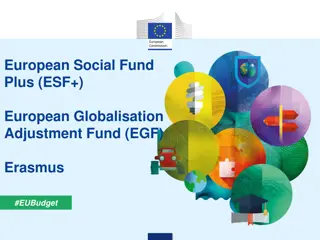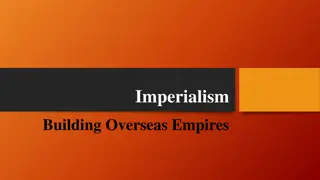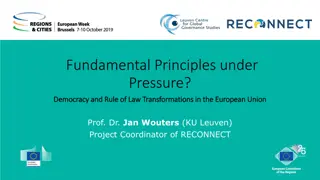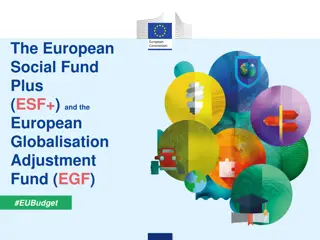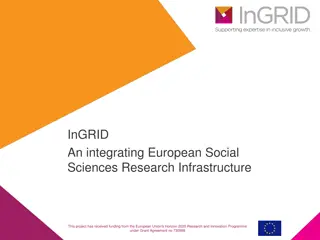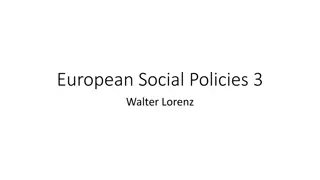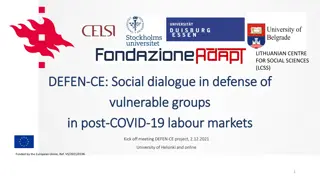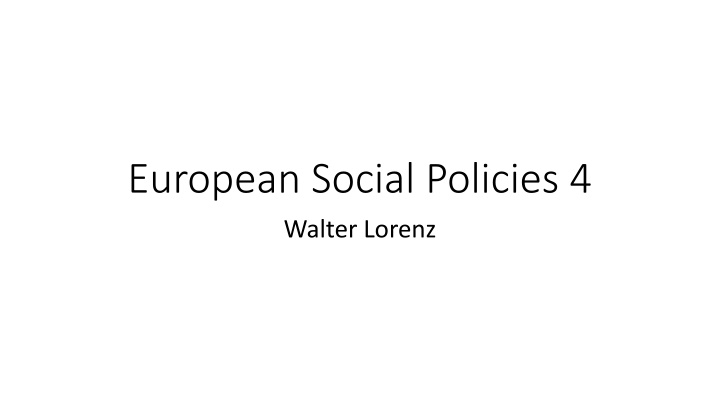
European Social Policies: Economic Priority, East-West Imbalance, Euro-Zone Integration
Explore the hierarchy of economic policies over social policies in the Lisbon Treaty, challenges of East-West imbalance within the EU, and the disparities in North-South integration in the Eurozone. Discover how the EU responds to national debt crises and the impact on social welfare sectors.
Download Presentation

Please find below an Image/Link to download the presentation.
The content on the website is provided AS IS for your information and personal use only. It may not be sold, licensed, or shared on other websites without obtaining consent from the author. If you encounter any issues during the download, it is possible that the publisher has removed the file from their server.
You are allowed to download the files provided on this website for personal or commercial use, subject to the condition that they are used lawfully. All files are the property of their respective owners.
The content on the website is provided AS IS for your information and personal use only. It may not be sold, licensed, or shared on other websites without obtaining consent from the author.
E N D
Presentation Transcript
European Social Policies 4 Walter Lorenz
Priority of economic over social policy Lisbon Treaty 1. The Member States shall coordinate their economic policies within the Union ( ). 2. The Union shall take measures to ensure coordination of the employment policies of the Member States ( ). 3. The Union may take initiatives to ensure coordination of Member States social policies . The way the three paragraphs are formulated shows a hierarchy, which gives priority to economic policies over employment policies and especially over social policies.
East-West imbalance and the social question The enlargement of the EU to the east raised questions about the feasibility of Social Europe, since it created a geographical divide in Europe in terms of productivity and wage levels. Rounds of enlargements have made the EU much more imbalanced and heterogeneous as compared to its predecessor, the European Economic Community, which in itself can be seen as an obstacle to a deep social dimension whether it requires more common legislation or common funds.
convergence? those who believe that all problems in the East will be slowly resolved by experiencing higher than average GDP growth need to look beyond the GDP growth figures and see gaps in health conditions, life expectancy and in particular, the extraordinary population decline experienced in Eastern Member States and especially the more Eastern regions of those. Economic convergence seems to be happening simultaneously with divergence regarding political values and social models.
Euro-zone greater integration North-South? dramatic disparities between North and South in terms of unemployment and poverty levels. the Eurozone crisis critically exposed the na ve policy theory-in-use of deepening European economic inter -dependence without an adequate safety net . High youth unemployment rates in Spain and high NEET rates in Italy increased dramatically 2011-3 The incapacity of Greece to deal with the social consequences of the banking and fiscal crises was even more striking, with an extraordinary rise in income inequality and material deprivation.
EU response to national debt crisis 2008 Excessive Deficit Procedure (all except Estonia, Luxembourg and Sweden.) In Greece and Cyprus, all welfare sectors have been affected. The economic crisis and austerity policies have had a catastrophic impact on people s income and on poverty. The social protection system has been dismantled and families reappear as the only existing safety net In Portugal, provision of public services, especially in healthcare and education, has been cut down. Structural reforms regarding labour market flexibility were imposed.
EU social policies and the Financial Crisis of 2008 The crisis showed the strengthening of an already existing tension between the economic integration and the social dimension. On the one hand, the EU aims towards more convergence in welfare issues and social policies and supports especially the new Member States; but on the other hand it only has few instruments of rather weak nature at its disposal. The Member States have to act under crisis-driven constraints, especially those subjects to a macroeconomic adjustment programme (ECB, EC and IMF) and/or subject to an excessive deficit procedure. As a result, the differences inside the EU and between the Member States are increasing tremendously . Kerschen, N., & Sweeney, M. (2016). Chances and Limits of the European Social Integration BT - Challenges to European Welfare Systems (K. Schubert, P. de Villota, & J. Kuhlmann, eds.). https://doi.org/10.1007/978-3-319- 07680-5_36
EU policies correspond to the 2nd disembedding of social relations since 1980s Nation state monopoly position in defining social integration conditions is being challenged at both supra- and sub-national level Demographic changes linked to economic pressures create added mobility Social relationships become temporary (growth in singles households) Privatisation of social responsibilities
Post 1989 liberal convergence or new divisions? Liberalisation of trade exchanges Expansion of European Union, Schengen Agreement Transnational social networks Lifestyle free-for-all end of ideology Re-emergence of (popular) nationalism Privatisation creates social divisions (political) insistence on facts (if necessary through fake news ) Algorithms to filter flow of information Post-modern relativism
Recovery plan for Europe Next Generation EU This is NextGenerationEU. This is more than a recovery plan. It is a once in a lifetime chance to emerge stronger from the pandemic, transform our economies, create opportunities and jobs for the Europe where we want to live. We have everything to make this happen. We have the vision, we have the plan, and we have agreed to invest together 806.9 billion*. It is now time to get to work, to make Europe greener, more digital and more resilient. https://commission.europa.eu/strategy-and-policy/recovery-plan- europe_en#the-largest-stimulus-package-ever
Brexit The fact that benefits of the single market do not automatically trickle down to disadvantaged regions and social groups played a major role in the 2016 referendum result in the UK. English people outside metropolitan areas felt disenfranchised politically and economically, while UKIP, reinforced by egocentric Tory politicians, ensured that their frustration is directed to Brussels instead of London and in particular Westminster. Contrary to UKIP stereotypes, British people did not experience a too social EU, but the opposite, thanks to UK governments that refrained from taking advantage of EU funding tools.
Picketty et al. proposal 2018 Our continent now finds itself caught between political movements whose only programme is the hunt for foreigners and refugees, a programme which they have now begun to implement; and on the other hand, parties that call themselves European, but which basically continue to imagine that pure and hard liberalism and the generalized competition of all (states, companies, territories, individuals) are enough to define a political project, without realizing that it is precisely the lack of social ambition that feeds the feeling of abandonment.



